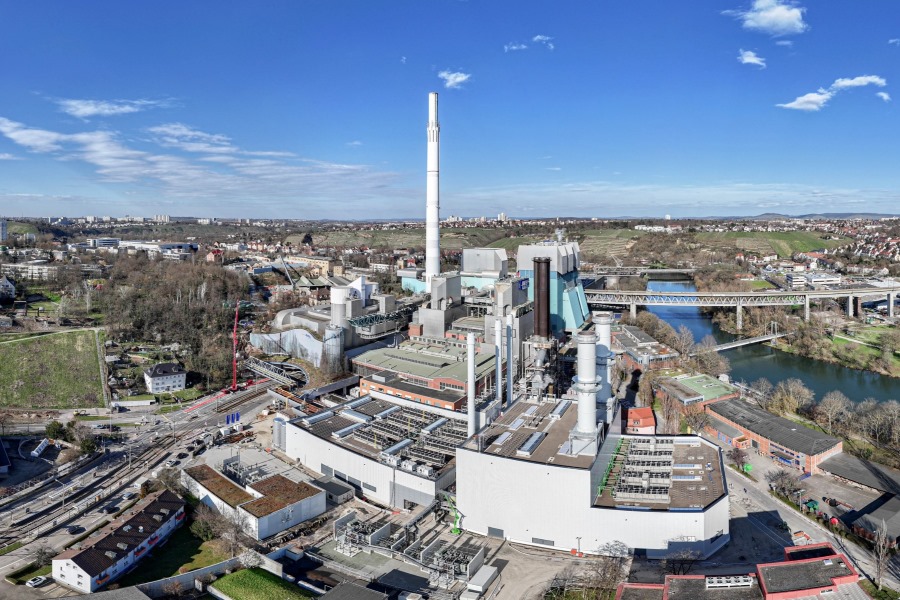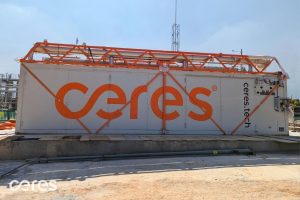The Stuttgart-Münster site stands out within EnBW’s power plant portfolio for its focus on the thermal treatment of waste – otherwise known as waste incineration. To maximize fuel utilization, the site operates on the CHP principle, generating both electricity and heat for the district heating network. Until now, three coal-fired boilers have provided additional heat during winter when the waste incineration plant alone could not meet demand. These coal-fired units are now being replaced by the newly commissioned hydrogen-ready gas-fired power plant.
The existing CHP infrastructure includes a hard coal-fired power plant with three boilers, a waste incineration plant with three waste-fired boilers, and three steam turbines. Since April 2024, a large heat pump has been contributing up to 24 MW of thermal energy to the district heating system.
Following approximately three years of planning and approval processes and two years of construction, the site has now undergone comprehensive modernization with the addition of the new gas turbine facility, including waste heat boilers and hot water boilers. The CHP plant serves both base and peak load demand.
Together with the Stuttgart-Gaisburg and Altbach/Deizisau CHP plants, the modernized plant supplies heat to over 28,500 homes, 1,400 businesses, and 380 public facilities via a district heating network that spans the central River Neckar region in and around Stuttgart.
After successful trial operations, the plant is scheduled to enter commercial service in the near future. Peter Heydecker, Chief Operating Officer for Sustainable Generation Infrastructure at EnBW, commented: “The energy transition is underway. EnBW is currently building half of all gas-fired power plants now under construction in Germany. Solely by switching from coal to natural gas, we are making dispatchable generation significantly more climate-friendly with around 50% lower carbon emissions. From the mid-2030s, we expect to take the next step and, after a second fuel switch, operate the plant on up to 100% low-carbon hydrogen, provided that this is available in sufficient quantities.
Dr.-Ing. Christian Bruch, CEO of Siemens Energy AG, the manufacturer of the gas turbines, stated: “Our technologies make it possible to replace fossil fuels with renewable energy sources and green gases such as hydrogen. Our innovative solutions help increase power plant efficiency and flexibility while reducing carbon emissions. We therefore see ourselves as a key partner in transforming the energy system.”
Following a brief period of parallel operation, the coal-fired units and fuel oil-fired gas turbines of the old cogeneration plant will be fully decommissioned by spring 2026. This marks a major step toward climate change mitigation in Stuttgart, which has set a target of achieving net zero emissions by 2035.
The hydrogen-ready fuel-switch plant also plays a critical role in supporting the continued expansion of renewable energy. Its high flexibility and rapid start-up capability make it ideal for balancing the grid when fluctuating weather conditions impact renewable electricity supply, thereby contributing to energy security in southern Germany.
EnBW is also advancing fuel switch projects at its Altbach/Deizisau and Heilbronn sites, converting former coal-fired plants into hydrogen-ready gas-fired facilities. Through these initiatives, EnBW continues the decarbonisation of its generation portfolio—encompassing a total capacity of 1.5 gigawatts and an investment of approximately €1.6 billion. Renewable sources already account for around 59% of EnBW’s installed generation capacity. By the 2024 financial year, the Group had reduced its carbon intensity by 45% compared to 2022, achieving a level of 272 g/kWh.






